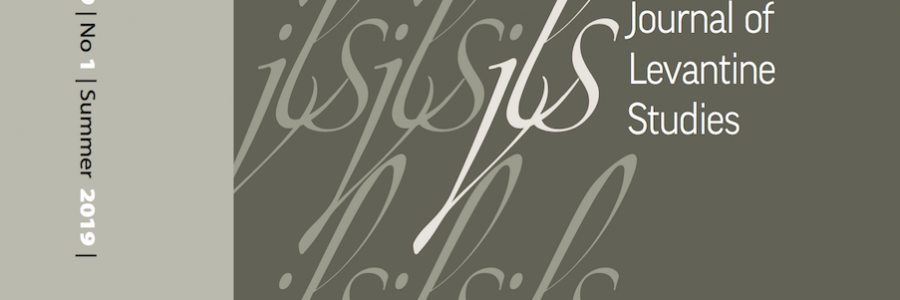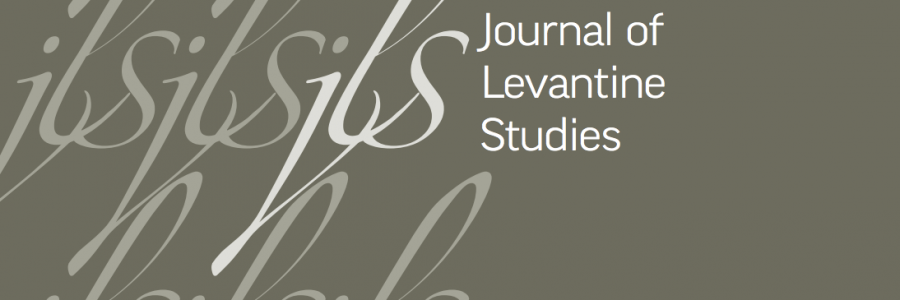-
Add to cartQuick view
Dialogue with Elias Khoury on Literature and Translation
Free!This is the protocol of a conversation conducted with the famous Lebanese writer Elias Khoury, who addresses languages, literatures, and translation.
Add to cartQuick view -
Add to cartQuick view
Partitions and Translations: Arab Jewish Translational Models in Fin de Siècle Palestine
Free!This article offers a new reading into translation works from early twentieth-century Palestine which operated in between the Arabic-Hebrew cultural and linguistic borderlands. Against the backdrop of the political and social events in that period which dominated by processes of national, ethnic, and religious partitions, the article explores the ways in which these Arab-Jewish translators fundamentally challenges the nationalistic and monolingual separatist ideology and represent an alternative political and cultural route. The article explores their unique translation methods that were based on four principles: Polyglot fusion—mixing Arabic and Hebrew, Jewish and Muslim traditions; loose distinction between oral and written traditions; dialogical approach that emphasizes the intertextuality of literary traditions and the intersections of languages and cultures; and the unfixed intersection between original source and translation. The fluidity that is inherent in these translation methods becomes a source of resistance to the dominant political force and dismantles any (national) claim over exclusive ownership of texts, traditions, or languages. In a time of struggle over the ownership of the (biblical) land and the (biblical) text, these translations focused on tales and traditions free from ownership and without any stable original source.
Add to cartQuick view -
Add to cartQuick view
The Philological Revolution and the Latinization of Arabic
Free!This article looks at the philological revolution and its influence on Oriental studies and Arabic studies in Germany generally, and on the German philological approach to Arabic studies within the Jewish community in Mandatory Palestine in particular. I argue that following this philological surge, the field of Arabic studies within the Jewish community went through a process of “Latinization”—a shift from an Arabic that is connected to daily, social life as a vehicle for communication to an Orientalist textual orientation having three clear principles: emphasis on the study of Arabic grammar, de-Arabization of the field in terms of experts and decision makers, and the treatment of Arabic as a classical language whose value lies in the past. I argue that the study of Arabic was juxtaposed with the study of Latin, which resulted in Arabic being seen not as a “living language” that is heard and used but as a language with mainly historical, religious, and disciplinary values. These Latinized pillars of Arabic studies—alongside additional sociopolitical processes that are beyond the scope of this article—had great influence in shaping the field of Arabic language studies in the Jewish community. I show how the main figures behind this shift were primarily German Jewish scholars who graduated from German universities. These scholars played a dominant role in two central, competing educational spheres in the country, in which the field of Arabic studies was forged and in which new norms of study and knowledge of Arabic were founded: The Hebrew University (where the Institute of Oriental Studies was established) and the school system (led by the Hebrew Reali School in Haifa). This new situation resulted in the creation of a new “Europeanized” Arabic in the heart of the Arab world.
Add to cartQuick view -
 Add to cartQuick view
Add to cartQuick viewGendered Temporality and Space: Women in Translation from Arabic into Hebrew
Free!This article examines how women translators impacted the enterprise of translation from Arabic into Hebrew in the years 1876–2018. Their involvement is explored along three variables: genre, women’s literature, and Palestinian literature. The findings indicate a significant gender bias expressed by the low rates of women among authors and translators. At the same time, from 1978 onward we see a steady rise in the involvement of women in translation. Closer examination, however, reveals a more nuanced picture. Women’s impact on the enterprise of translation from Arabic into Hebrew does not end with the quantitative aspect; their power is rooted in the attempt to question the hegemonic values of the translation enterprise by questioning the male/gender and Zionist/national exclusivity of that enterprise.
The rise in the presence of women in the field of translation introduces three new trends. First, the preference of women translators for translating long works expresses an effort by women translators to position themselves in a central place in the translation enterprise. Second, the preference of women translators for translating works by Arab women is a conscious choice to raise women’s voices, which are repressed in both cultures. Third, the women translators, along with the Arab translators, contributed both to the placement of the repressed Palestinian narrative at the center of the translation field and to that narrative’s inclusion in the agenda of the translation enterprise.
Add to cartQuick view -
 Add to cartQuick view
Add to cartQuick viewThe Political Syntax of the Absentees: A Translator’s Reflection on Stella Maris
Free!Stella Maris, by Elias Khoury, is the follow-up novel to My Name Is Adam: Children of the Ghetto, Volume I, but the two novels can be read out of sequence, since they do not follow a linear narrative. Each is made up of multiple layers of space and time, entwined with the history and biography of Adam Danoun, as they move in a time machine-like fashion between past and future, and parallel worlds.
Add to cartQuick view -
Add to cartQuick view
Vol. 9, No. 1 (Summer 2019)
Free!Add to cartQuick view -
Add to cartQuick view
Vol. 9, No. 2 Winter 2019
$45.00Add to cartQuick view -
 Add to cartQuick view
Add to cartQuick viewWhat Is Anticolonial Translation? The Form and Content of Binational Resistance in Maktoob
Free!This essay examines translation as an anticolonial literary form in the context of contemporary translation theory and activist translation practices in Palestine/Israel. Analyzing the impact of colonial paradigms on language, culture, and translation, it demonstrates that Arabic-to-Hebrew translation practices have been used to both instantiate and challenge existing colonial structures. With a focus onMaktoob, the first Palestinian-Jewish translation collective, it goes on to analyze the methods used by progressive translation groups to resist racism, occupation, and colonialism and to democratize the Israeli cultural sphere over the past seventy years. It argues that Maktoob’s unique contribution to this tradition emerges from its commitment to a systemic decolonization of the processes surrounding translation. Binational, bilingual translation, the collective’s working model, combines content-based approaches with formal, linguistic, and structural innovations in translation processes. The explicit aim of this model is to erode colonial effects such as Orientalism, cultural erasure, ethnoseparatism, literary theft, and the linguistic division between Arabic and Hebrew, and to establish a model that promotes democratic cultural participation among Jews and Palestinians. The essay demonstrates the continued influence of cultural decolonization on contemporary literary production and offers new insights into what this means for translation theory and practice.
Add to cartQuick view -
 Add to cartQuick view
Add to cartQuick viewGuest Editors’ Note: From the Neoclassical to the Binational Model of Translation
Free!Literary translation—whether a branch within comparative literature, linguistics, hermeneutics, or elsewhere in the academic disciplinary maze—has grown and developed mainly in accordance with the European neoclassical tradition. The previous issue of JLS was dedicated to the critique of the neoclassical model’s supposed transparency and impartial representation of the original source, allegedly trying to reach a “fluent” translation of the original.
To cope with translation from Arabic to Hebrew under the conditions of the present time, the Translators’ Circle in Maktoob proposes a pragmatic model of translation that transcends the comfort zone and is open to negotiation and a dialogical process of movement and wrestling in a dynamic relationship of dialogue. Although the model is fraught with practical, economic, and empirical difficulties, and is not necessarily pragmatic, it relies on the philosophy of pragmatism, according to which translation is not only a textual achievement but also action in the real world, which seeks to overcome the elements of alienation and degeneration of the individual, nationalistic portrait of translation. The translation turns from a metatext, which is placed behind the text and whose function is to explain and illuminate, into a social text, as a basis for communication and for expression of collective consciousness. In other words, and paraphrasing Ferdinand de Saussure’s notion that language should be studied in and for itself, we argue that translation is not only a thing in and for and of itself but also a communication tool, a byproduct of a comprehensive political process. To this end it expands the concept of intertextuality from hermeneutics to sociology. That is, intertextuality is not just an encounter between textual units, as is commonly the case in the fields of hermeneutics, linguistics, and literature, but also an interactive sociological mechanism based on encounter and reciprocity between people.
Add to cartQuick view
- Home
- About JLS
- Issues
- Vol. 9 No. 1 | Summer 2019
- Vol 8 No 2 Winter 2018
- Vol. 8, No. 1: Summer 2018
- Vol. 7, No. 2: Winter 2017
- Vol. 7, 1: Summer 2017
- Vol. 6, Summer/Winter 2016
- Vol. 5, No. 2 Winter 2015
- Vol. 5, No. 1 Summer 2015
- Vol. 4, No. 2 Winter 2014
- Vol. 4, No. 1 Summer 2014
- Vol. 3, No. 2 Winter 2013
- Vol. 3, No. 1 Summer 2013
- Vol. 2, No. 2 Winter 2012
- Vol. 2, No. 1 Summer 2012
- Vol. 1, No. 2 Winter 2011
- Vol. 1, No. 1 Summer 2011
- Blog
- dock-uments
- Subscribe
- Submit
- Contact




